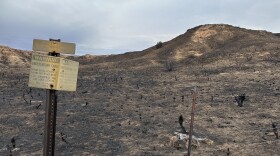It might be a slow wildfire season, but crews are still busy preparing. Colorado’s helicopter unit is taking advantage of the lull to train to be the first state team in the country that can fight fire at night.
The state sees it as a necessary tool as wildfires become more common with climate change. Nearly 3 million Coloradans now live in or near areas that are prone to wildland fire. That number has gone up 45 percent in the last five years.
“There is a particular need, especially in Colorado, to hop on these fires when they’re small and put them out when they’re small,” said Whitney Murphy, helicopter team manager with the Colorado Division of Fire Prevention and Control.
A bright light shines in the darkness from a helicopter as it hovers close above Brush Hollow Reservoir outside of Cañon City. The pilot repeatedly swoops down to dip the chopper’s bucket into the water before it’s dropped on nearby illuminated targets.
The pilot wears a pair of powerful night-vision goggles and the team on the ground helps guide the helicopter to where it needs to be. Successful training means good communication between the crew, Murphy said.

The 15-person crew has gone through a series of these nighttime maneuvers and the training allows the helicopter pilot to stay out after sunset. Murphy pointed out that “nearly all helicopter crews like mine in the country have been limited strictly to daytime operations,” until now.
Murphy is a 13-year veteran who joined the state’s helicopter team when it formed four years ago. When his boss told him the crew would train for nighttime firefighting, he was apprehensive.
“My initial perception was this is a big risk added on to what is already a complicated and complex operation in the helicopter firefighting world.”
Murphy’s views have changed since the training but his initial concerns are what has kept other states and federal agencies from going all-in on nighttime aviation firefighting.
Murphy’s boss, Colorado’s fire prevention aviation chief Vince Welbaum, was the one who pushed to try this out. He said a lot of states “are looking at us to see how this is going to be a success or not.”

Before this job, Welbaum was with the U.S. Forest Service. He worked with them to reinstate limited nighttime helicopter firefighting in California after a ban of more than 30 years. There was an accident in the 1970s where one pilot was killed and another severely injured after two helicopters collided in the dark.
“That became a concern, and people started using the night flying capability less and less on the Forest Service side until they basically eliminated the program,” Welbaum said.
The Forest Service declined a phone interview. In an email message, the agency said they resumed night operations in California to address concerns about wildfire response in urban areas where the tool could be helpful.
According to the LA Times, the Forest Service lifted the ban after scrutiny of how they responded to the 2009 Station Fire where two firefighters died in the flames. In response to the criticism, the Forest Service conducted a helicopter night operations study and concluded it could “conduct night operations safely and effectively.”
Welbaum said he wanted to bring that same resource to Colorado, especially as climate change brings drier summers and more wildfires.
“We used to have a fire season that was maybe three, four, five months long. And now, we basically have fire season year-round,” he said.
The U.S. Forest Service added that there’s a reason they only night fly in limited situations, and only in California — it’s high-risk and expensive. Their overall stance is, “the values at risk don’t warrant the risk or cost in most locations.” Colorado’s night program cost $100,000 to startup, and each recurrence training costs another $5,000. The trainings occur every three weeks throughout the summer.
Welbaum’s team will only go out at night if property and lives are at stake. Welbaum believes the money and the potential safety risk is worth it if people’s homes and lives are saved. He said the state “probably could have used night-flying capability on about four fires” in 2018.

For example, the Spring Creek Fire which burned in Southern Colorado near La Veta. It became the state’s third-largest wildfire in history and more than 140 buildings were destroyed.
Team pilot Kim Hatch worked the Spring Creek fire. The nighttime training he has now is something he wishes he could have already been doing. He remembers a particular house he was trying to protect from the flames. When it got dark, he had to land.
“I wasn’t sure if the house got saved or not until like, three days later,” Hatch said.
When he flew back in, he was relieved to see the house was still there, but he hates to think what could have happened. Hatch is glad he can now stick around to fight future nighttime flames.
“If you can continue on past that, ‘Oh, I’ve got to land,’ time, I think it could benefit,” he said.
Hatch and the rest of the helicopter team haven’t tried out their new skills on an actual fire yet thanks to this season’s extra moisture and the cooler spring. Team manager Whitney Murphy said it’s good timing for their nighttime training.
“It’s allowed us to hone these skills, and go home at night after doing it,” Murphy said. “That’s a really important thing. A lot of people don’t know [the] lives of wildland firefighters, you can go out for 14 days in a row. You can spend a lot of time away from home in the summertime, and that’s hard on people.”
Murphy adds that he does this job because he loves Colorado and he never likes to see it burn. This new program hopes to help keep that from happening.
Copyright 2019 CPR News






